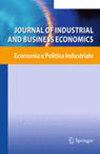高收入和中等收入国家外国直接投资决策与环境退化之间的非线性关系
IF 2.5
Q2 ECONOMICS
引用次数: 0
摘要
全球化虽然有利于在全球范围内传播知识和提高绿色技术,但也被认为是全球变暖的主要驱动因素之一。最近发生的世界事件,如艾滋病及其所有经济和社会后果,暴露了许多国家的对外依赖,特别是许多发展中国家对外国投资的依赖。虽然外国直接投资有助于经济增长,但它也可能对环境有害。因此,本研究分析了外商直接投资对温室气体、二氧化碳、一氧化二氮和颗粒物2.5排放的影响。1995年至2019年,对25个高收入国家和10个中等收入国家进行了面板自回归分布滞后模型,分析了短期和长期影响。考虑到非线性影响的可能性,还进行了非线性面板自回归分布滞后模型,以更详细地了解膨胀或收缩对变量的影响,并分析短期和长期影响。主要研究结果表明,电气化和从化石燃料向可再生能源的能源转型可能对限制固定资本形成总额、贸易开放和外国直接投资的污染效应至关重要。然而,简单地减少这三个因素是错误的,因为结果表明,它也有助于增加污染。外国直接投资和贸易开放减少了高收入国家的环境退化,增加了中等收入国家的环境退化,但一氧化二氮的排放除外。本文章由计算机程序翻译,如有差异,请以英文原文为准。
Nonlinear relationships between Foreign Direct Investment decisions and environmental degradation in high- and middle-income countries
Abstract Globalization, although beneficial in spreading knowledge and improving green technologies worldwide, is also considered one of the main drivers of global warming. Recent world events, such as the pandemic, with all its economic and social consequences, have exposed the external dependence of many countries, particularly the reliance of many developing countries on foreign investment. Although it contributes to economic growth, Foreign Direct Investment may also be harmful to the environment. Hence, this study analyses the impact of Foreign Direct Investment on emissions of Greenhouse Gases, Carbon Dioxide, Nitrous Oxide and Particulate Matter 2.5. A Panel Autoregressive Distributed Lag model was conducted for a group of 25 high-income and 10 middle-income countries from 1995 to 2019, allowing the analysis of short- and long-run impacts. Given the likelihood of nonlinear impacts, a Nonlinear Panel Autoregressive Distributed Lag model was also conducted to provide a more detailed understanding of the effects of expansion or contraction on the variables, and also to analyse short- and long-run impacts. The main findings suggest that electrification and energy transition away from fossil fuels to renewable energy may be crucial to limiting the polluting effect of Gross Fixed Capital Formation, Trade Openness and Foreign Direct Investment. However, it would be a mistake to simply reduce these three factors as the results reveal that it also contributes to increase pollution. Foreign Direct Investment and Trade Openness reduce environmental degradation in high-income countries and increase it in middle-income countries, except for Nitrous Oxide emissions.
求助全文
通过发布文献求助,成功后即可免费获取论文全文。
去求助
来源期刊

Journal of Industrial and Business Economics
Economics, Econometrics and Finance-Economics, Econometrics and Finance (all)
CiteScore
8.00
自引率
0.00%
发文量
31
期刊介绍:
This peer-reviewed journal, established in 1973, uses the lenses of industrial and business economics to investigate issues relevant to scholars, managers and policy makers.
The key areas of interest of JIBE are: industrial organization and policy; international business and international economics; innovation and entrepreneurship; corporate governance and finance.
Within these key areas, JIBE pays special attention to topics relating to grand challenges in a transforming world. A non exhaustive list of current issues includes: emergent technologies and industry dynamics; the digitalization of industries and financial markets; evolving multinationals and global value chains; environmental change and green transition; sustainable development of emerging economies; competition, regulation and structural policies in the platform economy.
JIBE welcomes papers that combine advancements in the theoretical understanding of phenomena with rigorous, systematic and original evidence-based empirical analysis, using quantitative or qualitative approaches as well as experimental and mixed methods. The journal is open to industry-, firm- and individual-level analyses, while the geographic scope may vary from subnational regions to nations and supra-national contexts, with a particular consideration of the EU and other integration processes.
The journal also publishes special issues and symposia aimed at opening debate among scholars on specific topics and discovery-type papers on emerging issues in industrial and business economics.
The journal is owned by the Associazione Amici di Economia e Politica Industriale.
 求助内容:
求助内容: 应助结果提醒方式:
应助结果提醒方式:


